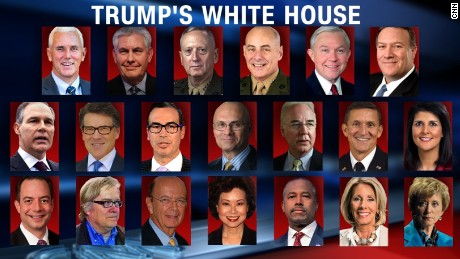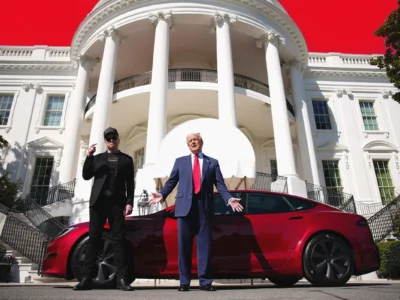What’s wrong with a business-heavy presidential cabinet?
It’s not just the revolving door problem or the different ways of conducting work; it’s the difference in fundamental purpose
 I know this doesn’t sound like a post about environmental law and policy, but bear with me. There is a connection.
I know this doesn’t sound like a post about environmental law and policy, but bear with me. There is a connection.
Donald Trump ran for president largely on the claim that his experience as a businessman, and lack of experience as a politician, qualified him to shake up Washington. Just enough people in just enough states bought that claim to give Trump an electoral college win.
Trump himself has no experience in the public sector. As he prepares to take over the Oval Office, he is doubling down on the idea that outsiders should run government. Of the 16 “cabinet-level” (as characterized by Politico) picks announced so far, I count 6 with no public-sector background (Steve Mnuchin, Treasury; Rex Tillerson, State; Wilbur Ross, Commerce; Andy Puzder, Labor; Ben Carson, HUD; and Reince Priebus, White House Chief of Staff, who has been a long-time political operative but apparently not a public employee except as a short-term law clerk). If you include the Administrator of the Small Business Administration as a cabinet-level position (as the Obama White House does), you can add another, Linda McMahon. And if you see Steve Bannon, whose position didn’t exist in the Obama White House, as a kind of co-chief of staff, the total grows to 8. By contrast, the current cabinet includes only two people without prior government experience (Sally Jewell, Interior, a special case if there ever was one, since she came from a business which profits when public lands are open for recreation; and Penny Pritzker, Commerce). I count military service as public sector experience, but if you don’t you should add one on the Obama side (Robert McDonald, Veteran’s Affairs) and three on the Trump list (James Mattis, Defense; John Kelly, Homeland Security; and Michael Flynn, National Security Advisor).
Does the private-sector tilt of the incoming administration matter? I think it does, for several reasons. A couple of those reasons have been widely recognized.
First, there’s the revolving door problem. Appointees who come from (let’s just say) the fossil fuel industry and expect to go back to that industry after a few years in government have a conflict of interest that can’t be solved by divesting assets prior to entering public service. Even with the best of intentions, it would be only human to unconsciously shade policy choices in favor of potential future employers or clients.
Second, there’s the very different employment culture. In the private sector, top-down governance structures are common. CEOs are accustomed to being able to tell their entire organization what to do, without much pushback from underlings. But in the government, no one is the unquestioned boss. Everyone in the executive branch, including the president, has to answer to funders in Congress as well as to the media (mainstream and otherwise) and interest groups. Much of what they say is open to public scrutiny, through FOIA. And most of their workers are protected by civil service laws from retaliation for public or private disagreement with the agency’s policies or its head.
But there’s a more fundamental problem with private-sector minds running the public sector, which hasn’t been sufficiently highlighted. That’s that the private sector and the public sector have fundamentally different goals. Success on one side doesn’t necessarily equate with even understanding what success means on the other side.
The private sector focuses almost exclusively on growing short-term profits for its shareholders. There’s nothing inherently wrong with that; corporations can provide valuable vehicles for aggregating capital. But the private sector can’t substitute for government’s role, which is very different. The public sector expresses and implements our most cherished community goals. Business is about doing well for yourself. Government is about doing well for the collective. Those are very different things, and individuals steeped by long practice in the norms of business don’t necessarily understand the importance, or even recognize the existence, of collective interests.
Trump’s touted working-class supporters might be thinking about that difference now, as they contemplate the nomination of fast-food CEO and critic of raising the minimum wage Andrew Puzder to be Secretary of Labor. Making a lot of money for a restaurant chain is definitely not the same thing as maximizing employment or protecting workers.
Which brings us to the environmental connection. Environmental protection is by its very nature a collective benefit endeavor, putting the interests of the group ahead of those of individual businesses and emphasizing the long term over the short. Trump and much of his leadership team show no sign of understanding the importance of collective values, or even of industry internalizing its costs, so perhaps its not surprising that they seem so ready to put the short-term interests of the fossil fuel industry ahead of the long-term interests of the country and the planet.
Okay, I’m really reaching here, but maybe there’s a very small silver lining in the fact that three of four key environmental appointees (Scott Pruitt, EPA; Rick Perry, Energy; and Ryan Zinke, Interior) actually do have public service experience. The exception? Rex Tillerson. While the environment may not be the first thing on the Secretary of State’s list of priorities, it’s an important part of the portfolio. John Kerry, with a career in public service, realized the importance of the Paris agreement on climate change mitigation, but also of ocean protection and other necessarily global efforts. Tillerson can see how accession to the UN Convention on the Law of the Sea could help US business interests; as Exxon CEO he supported accession in 2012. But I’m not optimistic that he’ll see the value of protecting the public goods of the natural world, especially if that conflicts with the short-term, individualistic value of maximizing extractive interests.
Although I disagree with most of his policy positions as I’ve seen them reported, I’ve actually got more hope for Ryan Zinke, who seems to understand the inherently collective value of federal landownership. At least one might hope for a constructive discussion with him of the full range of values at stake in policy decisions.
Reader Comments
6 Replies to “What’s wrong with a business-heavy presidential cabinet?”
Comments are closed.







Holly said;
“….The public sector expresses and implements our most cherished community goals…..”
Dear Holly,
We can all agree that climate mitigation is not even close to being “cherished community goals.” If were true that the Clean Power Plan was indeed a cherished community goal, then that would mean that most of ordinary citizens would gladly pay carbon taxes and higher prices for electricity.
We do not cherish wasteful government programs that only add to our burdens. The public sector needs to withdraw from climate regulation, starting soon.
You are wrong, bqrq (and shouldn’t you be willing to use your real name on this site, as the contributors do?). Bequeathing a vibrant planet to future generations is one of our most cherished societal goals. I’m a strong believer that societal goals are always up for societal discussion. But rather than engage directly on the question of what we owe our successors, anti-environmental interests keep trying to muddy the waters by denying that we are irreparably harming the world on which we live. If you think the Clean Power Plan isn’t worthwhile, fine, make that argument. But do so with honest recognition of the limited costs it would impose, the benefits it would produce, and the fact that it reserves key decisions to the states. EPA’s cost-benefit analysis for the Clean Power Plan estimates compliance costs of $5.1 to $8.4 billion by 2030 (depending on state choices), compared to monetizable benefits of $21 billion to $95 billion for the same time period in addition to unmonetizable environmental benefits. If that doesn’t sound like a good deal to you, you ought to explain why, instead of just saying people don’t want it, without any support and contrary to the multiple polls Dan recently linked to. If you want us to take your comments seriously, you should put more effort into making them persuasive.
Dear Holly,
It is interesting to note that you do not claim that the Clean Power Plan would actually mitigate global climate. We both know that such a claim could be false and misleading.
In order to effectively mitigate climate change it is necessary to reduce the average global atmospheric temperature. The Clean Power Plan would have no measurable, verifiable effect on global temperature.
No evidence has been offered to demonstrate that the Clean Power Plan actually mitigates climate, there are no guarantees, no measurements, no performance standards, no proof, not even a reasonable argument.
The compliance costs are real but the “monetized benefits” are fraudulent nonsense. The true benefit is zero.
The great climate scare is coming to an end.
Anything that reduces global greenhouse gas emissions mitigates climate change. The Clean Power Plan is one way to reduce GHG emissions in the United States. Emission reduction in the US both directly reduces global emissions and makes it more likely that other high emitters (such as China) will follow through on their commitments. If you (or Scott Pruitt) don’t like the Clean Power Plan, why not offer an alternative plan for GHG emission reductions? It’s worth noting that the CPP intentionally leaves the key choices to the states. It’s also worth noting that because the CPP creates incentives to reduce the use of coal, an extraordinarily dirty fuel, to produce electricity, it would reduce conventional pollution as well. Even climate deniers ought to be in favor of that.
Now, unless you have a specific argument about costs or benefits that indicates you’ve actually read the regulatory impact analysis for the CPP, or at least its executive summary, go troll some other site.
It truly saddens me to see that out of 20 picks, only 3 are women and only 1 is a person of color. This does not reflect the makeup of our society at all, and looks to me like an administration of old, rich white men. It’s hard for me to believe that this group is going to care about anything other than making things better for the rich. Looks to me like big business is going to win big, and the middle class and the working poor are going to be the losers.
Regarding the Trump Administration, Chris Austin said;
“…. the middle class and the working poor are going to be the losers……”
Dear Mr. Austin,
Your concern is not unreasonable and is shared by many. Our hope and intention is that the middle class and working poor would substantially benefit from a growing economy.
Each year around Christmas I have lunch with an old friend who works very hard for low wages, he constantly struggles to support his wife and three children, they live in public housing in a small apartment.
My old friend did not vote for Trump and is still angry so we had a long conversation. He will not be persuaded until Trump takes strident affirmative action to assuage his deepest fears. And that may happen. None of us knows what Trump is going to do until it happens.
There are a lot of folks of there who share the sentiments of my friend and they could eventually be persuaded to get on board. Let us hope that by this time next year we will all be singing together in harmony as happy citizens of a great Nation. May God Bless America.
Merry Christmas !!!